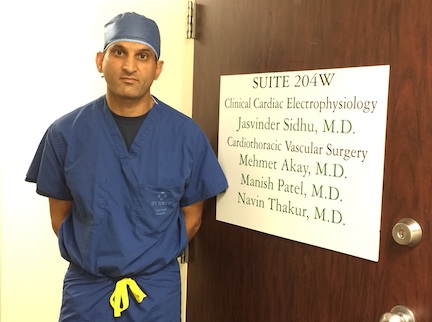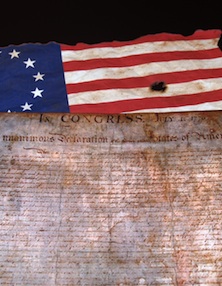
“Phi Beta Kappa was founded on December 5, 1776, with a
message of The Love of Learning is the Guide of Life. Learning
and applying what you learn for the betterment of your fellow
man is a great guide for anyone’s life. I have lived true to the
ethos of ΦBK and will continue to do so.”
— Jasvinder S. Sidhu, MD
By Anne Shen
Patient care lies at the intersection of the sciences and humanities, merging the biology of human bodies with culture, language, and history. With this understanding, Jasvinder S. Sidhu, MD, has combined the diverse perspectives of the liberal arts with medical expertise to provide high-quality patient care to underserved communities. Even before the start of his medical career, Sidhu included an eclectic mix of subjects in his undergraduate studies at the University of Michigan in Ann Arbor, where he became a member of Phi Beta Kappa in 1992. In addition to completing a Bachelor of Sciences in cellular and molecular biology, he enjoyed courses in political science, art history, and military history, even sitting in on classes in which he was not enrolled.
After completing his undergraduate studies, Sidhu pursued a medical degree at the University of Michigan Medical School with plans to continue a career in academic research focusing on molecular biology. After receiving his MD in 1996, he completed an internal medicine residency in Cleveland, Ohio, and there he remained until 2002, serving as a hospitalist and senior instructor at the University Hospitals of Cleveland. Sidhu was then recruited by Baylor College of Medicine to Houston, Texas, to receive training as a Cardiovascular Disease fellow.
However, two of Sidhu’s mentors left the program soon after he joined, and he felt that the emphasis of his training had changed. That same year, Sidhu’s father was diagnosed with severe dementia. During this personal crisis, he turned to his faith in God to determine his path for the future. He became interested the electrical properties of the heart when he remembered a previous project in which he helped generate a transgenic mouse with Wolff-Parkinson-White syndrome, a condition where an extra electrical pathway in the heart produces rapid heartbeat.
To pursue his newfound calling, Sidhu completed two additional years of clinical training in electrophysiology, a branch of cardiology focused on the diagnosis and treatment of heart rhythm disorders, or arrhythmias. Following his training, he began working in Houston. Sidhu noticed that many of his patients were commuting from Victoria, a city 126 miles away, for treatment. To meet the need for electrophysiology care in Victoria, he established a new practice at DeTar Hospital Navarro, where he travels twice a week from his home in the Houston area. Although the DeTar electrophysiology lab began with little equipment and prior training, the practice has achieved and maintained exceptional patient outcomes through the efforts of Sidhu and his staff.
As he continues expanding access to electrophysiology care for the Victoria community, Sidhu finds satisfaction in his interaction with patients, saying, “The most rewarding thing I do daily is maximize God-given gifts to make a difference in people’s lives.” In his constant effort to improve patient care, Sidhu seeks to maintain an open mind to novel ideas. He believes that doctors have much to gain from the diverse viewpoints and methods of thinking cultivated by the liberal arts, and he attributes his ability to view treatment from a patient’s perspective to his liberal arts courses from his undergraduate studies at the University of Michigan.
Sidhu’s work is a testimony to his dedication to patient care; although he is an expert in a highly technical field, he considers the ability to develop relationships with patients from diverse backgrounds his most important skill.
Anne Shen is a senior at Wellesley College majoring in biological sciences. Wellesley College is home to the Eta of Massachusetts Chapter of Phi Beta Kappa.




